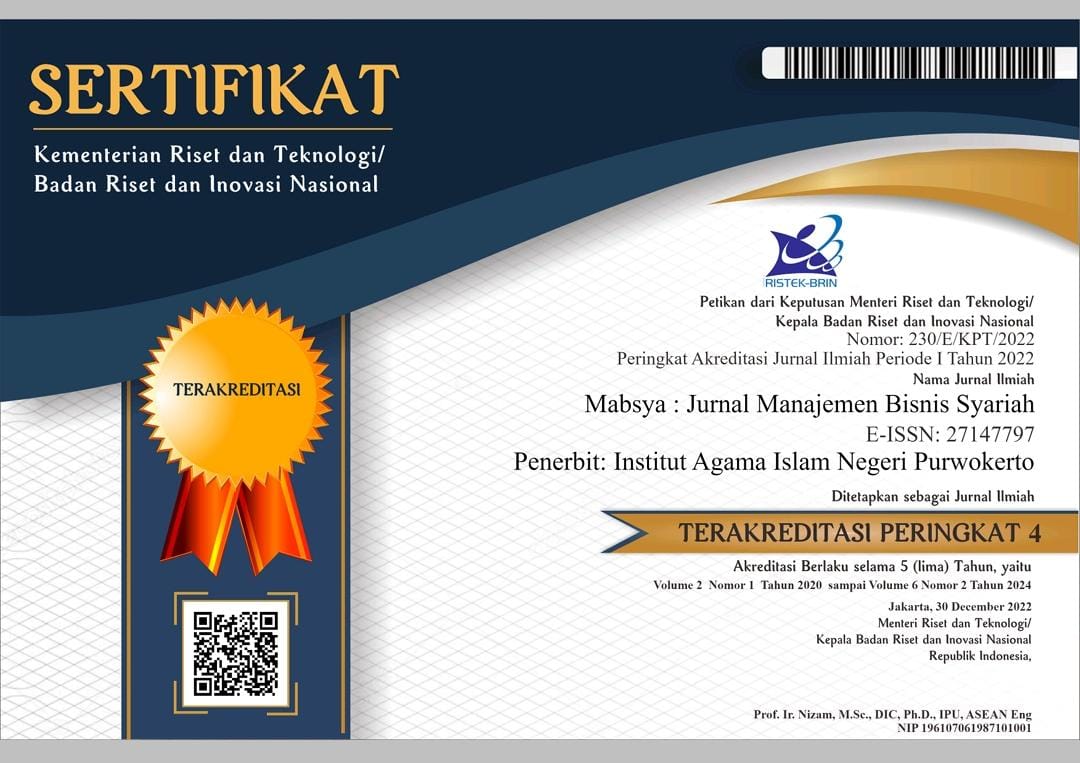Analisis Kinerja Reksadana Saham dan Reksadana Indeks dalam Penilaian Tingkat Efisiensi Pasar Modal di Indonesia
DOI:
https://doi.org/10.24090/mabsya.v3i2.4577Keywords:
Equity Mutual Funds, index mutual funds, capital market efficiencyAbstract
Mutual funds are designed to raise investment funds. The objectives of this study are: to determine the performance of mutual funds on the LQ-45 index is higher than the performance of equity funds in the Indonesian capital market and to measure the level of efficiency in the capital market using CAPM modeling and using Net Active Value (NAV) data per year for the 2015 period. -2019. To determine whether a mutual fund is good or bad, it is not measured by how much the return has been generated or by how big or small the risk of fluctuation is, but this is seen from how much the mutual fund performs with its reference index. If the performance of index mutual funds is better or the performance of stock mutual funds is lower overall, the capital market can be said to be efficient. The results of this study indicate that the performance of the LQ-45 index mutual funds is smaller than the performance of the more superior stock mutual funds above. So it can be concluded that the Indonesian capital market is an inefficient Indonesian capital market.References
Aziz, F. A. (2020). Menakar Kesyariahan Fintech Syariah di Indonesia. Al-Manahij: Jurnal Kajian Hukum Islam, 14(1), 1-18
Aziz, J. A. (2011). Reformulasi konsep najis ala Ahmad Hassan (1887-1958). Al-Manahij: Jurnal Kajian Hukum Islam, 5(1), 39-52.
Aziz, J. A. (2012). Transformasi Akad Muamalah Klasik dalam Produk Perbankan Syariah. Al-Tahrir: Jurnal Pemikiran Islam, 12(1), 21-41.
Aziz, J. A. (2014). Transformasi Akad Bay'al-Murabahah dari Konsep Fikih ke Produk Bank (Analisis Kritis Perspektif Fikih Muamalah). Al-Manahij: Jurnal Kajian Hukum Islam, 8(2), 247-266.
Aziz, J. A. (2015). Pemikiran Politik Islam Muhammad ‘Abid Al-Jabiri: Telaah terhadap Buku al-‘Aql al-Siyasi al-‘Arabi: Muhaddidatuh wa Tajalliyatuh. MIQOT: Jurnal Ilmu-Ilmu Keislaman, 39(1).
Aziz, J. A. (2017). Islamic Banking in Global Economic Context (Critical Studies of Operational System and Performance of Islamic Banking). AL-IHKAM: Jurnal Hukum & Pranata Sosial, 12(2), 343-361.
Aziz, J. A. (2017). Dekonstruksi Paragdimatik Pengembangan Zakat: Analisis Kritis Pemikiran Yusuf al-Qaradawi. Ijtihad Jurnal Wacana Hukum Islam dan Kemanusiaan, 17(2), 191-215.
Dahlan, A. (2014). Two Tier Mudarabah di Bank Syariah: Transformasi Fikih dalam Bisnis. Al-Manahij: Jurnal Kajian Hukum Islam, 8(1), 95–108.
Warsito, C. (2015). The Image of Financial Institution as Islamic Bank In Mediation Service Quality and Customer Satisfaction on Customer Loyalty in Purwokerto. Al-Iqtishad: Jurnal Ilmu Ekonomi Syariah, 7(2), 217-228.
Hadi, R. (2016). Pola Kerukunan Umat Beragama di Banyumas. Jurnal Kebudayaan Islam, 14(1), 65-78.
Setyawati, S. M., & Raharja, M. C. (2018). Trust dimensions model in creating loyalty stage for service consumers of Sharia rural banking.
Wardani, D. K., & . S. (2020). Pengaruh Sosialisasi Pasar Modal dan Persepsi atas
Risiko terhadap Minat Investasi Mahasiswa di Pasar Modal. Jurnal Akuntansi Maranatha, 12(1), 13–22. https://doi.org/10.28932/jam.v12i1.2044
Zaluchu, S. E. (2020). Strategi Penelitian Kualitatif dan Kuantitatif Di Dalam
Penelitian Agama. Evangelikal: Jurnal Teologi Injili Dan Pembinaan Warga Jemaat, 4(1), 28. https://doi.org/10.46445/ejti.v4i1.167
https://www.bareksa.com
https://www.finance.yahoo.com
https://www.bi.go.id
https://www.idx.co.id
Downloads
Published
How to Cite
Issue
Section
License
Copyright (c) 2021 Ainani Nur Aziqoh

This work is licensed under a Creative Commons Attribution 4.0 International License.
Authors who publish with this journal agree to the following terms: Authors retain copyright and grant the journal right of first publication with the work simultaneously licensed under a Creative Commons Attribution 4.0 International License that allows others to share the work with an acknowledgment of the work's authorship and initial publication in this journal.














